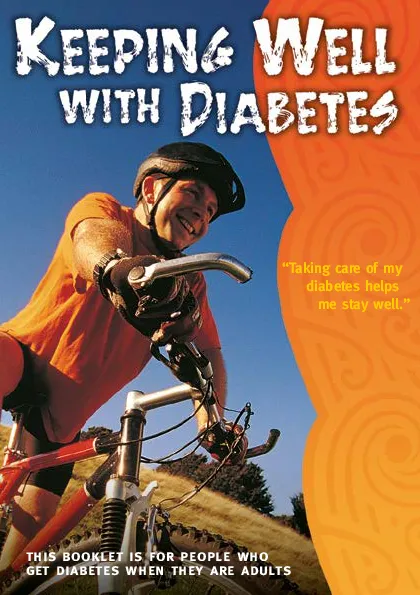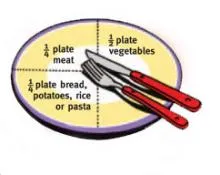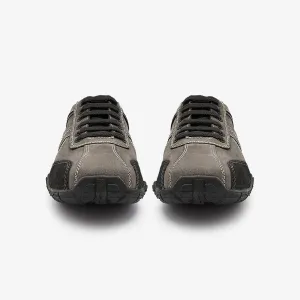This booklet is for people who get diabetes when they are adults
What is diabetes?
Diabetes is when you have too much sugar in your blood.
Some adults who develop diabetes may have no symptoms.
Others may:
- feel very thirsty
- pass a lot of urine
- feel very tired
- have blurred vision
- have urinary infections, skin infections
- heal slowly.
People who think they may have diabetes should see their doctor or nurse.
If diabetes is not treated, it can lead to damage of the heart, eyes, feet, kidneys and other parts of the body.
Who is at risk?
People who:
- are overweight
- do little exercise
- have diabetes in the family/whānau
- are over 40 years of age
- are Māori or Pacific Island.
Also women who have had:
- diabetes in pregnancy
- large babies.
Managing diabetes
There is no cure for diabetes. But there are things you can do to stay well.
Your doctor or diabetes nurse will teach you how to keep your blood sugar at a healthy level and to keep healthy.
Managing your diabetes might mean:
- eating healthy food and exercising regularly, or
- eating healthy food, exercising regularly, and taking tablets, or
- eating healthy food, exercising regularly, and having insulin injections (insulin helps remove the sugar from the blood), or
- eating healthy food, exercising regularly, having insulin injections and taking tablets.
Healthy eating
Eating the right foods helps to keep your blood sugar under control.
You don’t need to make special meals – the food that is good for you is good for all the family.
It’s good to eat three regular meals every day. Watch out for sugar and fat. Too much of these is bad for you.
Your dietitian, doctor or nurse can help you with your eating plan. They will tell you HOW MUCH of each food you can eat, and HOW OFTEN.
They will also give advice about alcohol.
Enjoy these foods
Eat as much as you like of:
- green vegetables, eg, taro leaves, pūha, watercress, broccoli, green beans, cabbage, peas, leeks, spinach, lettuce
- salad vegetables, eg, tomatoes, celery, cucumber, spring onions, mushrooms
- some root vegetables, eg, carrots, radishes, beetroot, swede
- kamo kamo, pumpkin, zucchinis, peppers, asparagus, marrow.
Eat some of these foods at each meal, eg:
- bread, kūmara, green cooking banana, yam, breadfruit, taro, pasta, low sugar cereal, rice, noodles, porridge, chapati, crispbread, muffin, scone, potato, corn, tapioca, parsnip
- fruit, eg, raw fruit, or fruit that is stewed or canned without sugar.
Eat a small serving of protein food once or twice a day, eg:
- meat with fat cut off, chicken without skin, fish, egg, split peas, lentils, baked beans, bean salad.
Eat low-fat dairy food once or twice a day, eg:
- lower-fat milk such as trim milk or milk with added calcium, or soya milk
- yoghurt (unsweetened)
- cottage cheese, other low-fat cheese.
Be very careful with sugar and fat
- use only small amounts of margarine, avocado, peanut butter, cooking oil, nuts (dry roasted).
Avoid food and drinks with too much sugar, eg:
- all types of sugar, jam, honey, lollies, chocolate, muesli bars, sweetened fruit, ice cream, cakes, puddings, biscuits
- sweet drinks, soft drinks and juice.
Avoid fatty foods, eg:
- food fried in oil or fat, eg, fried eggs, fried bacon, fish and chips, takeaways cooked in oil
- other fatty food, eg, butter, meat with fat on, fatty bacon, sausages, saveloys, pastries, coconut cream, croissants, gravy, mayonnaise, dripping, lard, kremelta.
Try steaming, boiling or microwaving food.
If stewing meat, leave it to cool and skim the fat off before serving.
Regular exercise
Regular physical activity helps lower blood sugar. It can also make you feel better and sleep better.
Discuss your plans with your doctor BEFORE you start to exercise.
Walking is a good type of physical activity. So is swimming, cycling or jogging.
Start with just a few minutes each day. Then gradually build up to 30 minutes of physical activity four times a week.
If you are on insulin, carry glucose when you exercise, in case your blood sugar drops.
If you are on tablets, check with your doctor or nurse to see if you should carry glucose when you exercise.
Try to keep active with other activities such as gardening, bowls, kapa haka, mau rakau, mowing lawns, dancing, kilikiti, family walks, waka ama, gathering kai moana.
Check your feet at least once a week
Diabetes can lead to foot problems.
Check your feet, the soles of your feet and in between toes. Tell your doctor, nurse or podiatrist (person who treats feet) if you notice anything unusual, such as:
- redness, or any other change in colour
- swelling
- breaks in the skin
- blisters.
Care for your feet
Keep nails trim and smooth, avoid going barefoot, wear comfortable shoes and socks that are not too tight, moisturise feet and legs regularly, and keep your feet out of hot water.
Corns, dry cracked heels, thickened toenails, athlete’s foot, etc, should be treated by a podiatrist.
Ask your doctor, nurse or podiatrist to check your feet regularly.
Healthy weight
People with diabetes need to stay at a healthy weight to control their diabetes. Your doctor, nurse or dietitian will advise what is a good weight for you.
Regular exercise and eating healthy food will help keep you at a healthy weight.
Blood sugar levels
Maintaining a balanced blood sugar level is important to keep well.
Your doctor or nurse will teach you how to check your blood sugar level. A healthy blood sugar level is between 4–8 mmol/L.
Hypo – low blood sugar (hypoglycaemia)
Blood sugar can sometimes drop to very low levels (eg, below 4) in people who are on certain types of tablets or insulin. This can cause a “hypo” which can make you pass out, if not treated quickly.
Some people get warning signs of a hypo. Other people do not.
Warning signs of a hypo:
- feeling dizzy or light headed
- blurry vision
- feeling weak and trembling
- a headache
- looking pale, sweaty skin
- a thumping heart
- hunger
- feeling confused, anxious or irritable
- pins and needles in the lips and tongue.
If you get one or more of these warning signs you need to treat your hypo quickly.
How to treat a hypo
Take some glucose quickly. Either:
- 1 tablespoon of glucose powder in water
- or 3 to 4 glucose tablets (vita or dextro)
- or 8–10 small glucodin tablets
OR
2 heaped teaspoons of jam, honey or sugar dissolved in water
OR
half a glass of a sweet drink like lemonade or fruit juice
OR
6 to 8 jelly beans
Wait 5 to 10 minutes. If you still feel hypo, repeat the treatment.
After 10 to 15 minutes have a meal if it is due, or a snack.
Hyper – high blood sugar (hyperglycaemia)
Sometimes the blood sugar level rises above normal (above 8).
This may be due to:
- eating sugary foods
- forgetting to take your tablets
- missing an insulin injection
- being sick, having an infection or fever.
Warning signs of a hyper may be:
- being very thirsty
- passing a lot of urine
- feeling very tired
- getting infections, or infections that do not heal.
Or you may not get any warning signs.
Managing high blood sugar
It is okay if your blood sugar level rises occasionally and if it lasts just a few hours, but if it’s not managed, it can be dangerous.
See your doctor or nurse if your blood sugar rises often or lasts for a long time. They will help you find out why your blood sugar level keeps rising.
They will also help you manage your sick days.
Have regular health checks
People with diabetes should see their doctor or nurse regularly.
People with diabetes can now have one free health check every year.
Make an appointment with your doctor – or the doctor’s nurse – for your free check.
They will check:
- your weight
- your blood pressure
- your plan to stay well
- that your blood and urine tests are up-to-date
- your feet
- your general health
- that your eye checks are up-to-date.
If at any time you are worried or do not feel well, get checked by the nurse or doctor right away.
Diabetes organisations
Diabetes New Zealand
PO Box 12-441, Wellington, New Zealand.
Phone (04) 499 7143, Fax (04) 499 7146
Email:
Diabetes Youth New Zealand
E-mail:
Website:
Te Roopu Mate Huka
Website:
This booklet is available in English, , , , and . These, plus Tokelauan and Fijian versions, are all available on these Ministry of Health websites or or by calling your local District Health Board in the medical white pages of the telephone book or your local hospital.
Diabetes Health Care Team
| Health professionals | Name | Phone number |
|---|---|---|
| Doctor | ||
| Diabetes Nurse | ||
| Dietitian | ||
| Diabetes specialist | ||
| Podiatrist (foot care) | ||
| Ophthalmologist (eye doctor) | ||
| Pharmacist | ||
| Notes |
Tips for keeping healthy
With help from your health care team and by following these simple tips you can stay well:
- Eat healthy food
- Eat regular meals
- Keep physically active
- Check your feet regularly
- Have regular health checks
- Stay a healthy weight
- Stay smokefree.
ISBN 978-0-478-19285-8 (print)
ISBN 978-0-478-19286-5 (online)
Check with your doctor. Not all doctors offer this free service.

 Cart(
Cart(












